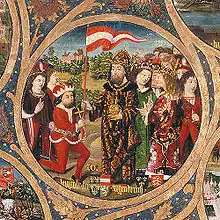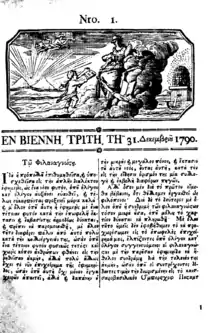
Greeks in Austria number between 5,000 and 18,000 people. They are located all around the country, but the main community is located in Vienna.
History

.jpg.webp)
Contacts between the Greeks and the Austrians can be led back in the aristocracy of the Middle Ages. All the Babenberg dukes from Leopold V onward were descended from Byzantine emperors.
The Armenian Johannes Theodat opened on 17 January 1685 Vienna's first coffee house in Haarmarkt. As a reward for his services, he was granted the privilege of being the only trader in the city to sell coffee as a drink for 20 years. Following, by 1700, four Greek merchants had the privilege to serve coffee in public.
In the 18th century, Vienna was the centre of Greek diaspora where persons like Rigas Feraios, Anthimos Gazis, Neophytos Doukas and the Ypsilantis family prepared the Greek War of Independence. There were also various institutions founded in Vienna that promote the Greek language and learning, contributing to the Modern Greek Enlightenment. In 1814, the Count Ioannis Kapodistrias, at that time Foreign Minister of the Russian Empire, in collaboration with Anthimos Gazis, founded in Vienna the Philomuse Society, an educational organization promoting philhellenism, such as studies for the Greeks in Europe.[1]
Additionally, ethnic Aromanians coming mostly from Moscopole, and generally from the Balkans, who self-identified as Greeks, have also been considered as part of the Greek diaspora.[2][3]
Furthermore, of great economic importance and social acknowledgment attained the Greeks in Austria in the 19th century. The first Greek newspaper was printed there and the Hellenic National School in Vienna is today the oldest such in the world that has remained continuously in operation. In 1856, after a request by Simon Sinas, Johann Strauss II composed the Hellenen-Polka (Hellenes Polka) op. 203 for an annual ball of the Greek community in the Austro-Hungarian empire.[4]
In 20th century, Austria (and especially Graz and Linz) was a popular destination for Greek students.
Architectural heritage
The Austrian magnate of Greek origin Georgios Sinas (father of Simon Sinas) invited the Danish architect Theophil Hansen who worked in Athens (and had designed there major public buildings like the Zappeion and the Academy of Athens) to design for him some new buildings for his companies in Austria. Other Greek Austrians like Nikolaus Dumba and Ignaz von Ephrussi also gave Hansen contracts for buildings in the Classical Greek style and the Gräzisierter-Neorennaissance-Stil. After Works like the Palais Ephrussi and the Palais Dumba Hansen was famous and build many other public buildings in Austria like the Parliament of Austria and the Musikverein.
In the former Greek Quarter of Vienna at the Fleischmarkt there are the two historical Greek Orthodox parishes (St George and Holy Trinity). A traditional Austrian Restaurant there is called Griechenbeisl ("Greek Tavern", because of its Greek visitors since the 18th century) and a street Griechengasse ("Greek Lane").
Notable Greeks in Austria
- Coudenhove-Kalergi family, noble family of mixed Flemish and Cretan Greek descent.
- Nikolaus Dumba (c. 1830–1900), industrialist, liberal politician, benefactor of Greece and patron of the arts. Sponsored the construction of Musikverein.
- Konstantin Dumba (c. 1856–1947), diplomat serving as its last accredited Ambassador to the United States.
- Simon Sinas (c. 1810–1876), banker and diplomat, benefactor of Greece.
- Constantin von Economo (c. 1876–1931), psychiatrist and neurologist.
- Ephrussi family, banking family of Romaniotes descent.
- Demeter Laccataris (c. 1798-1864), painter based in Pest.
- Logothetti family, noble family originally from Zante.
- Hugo II Logothetti (c. 1852–1918), diplomat and last emissary of the Habsburg monarchy in Tehran.
- Baltazzi family, aristocratic banking family, baroness Mary Vetsera's maternal family
- Theodor Baltazzi (c. 1788-1860), prominent banker born in Istanbul.
- Aristides Baltazzi (c. 1843-1914), was a horse breeder, member of the Austrian Imperial Council and large landowner.
- Pappas Family, founders of the Alpine construction group and importers of Mercedes-Benz in Austria and Hungary
- Anastasios Pappas, Merchant in Vienna, 1821 revolutionary, member of Filiki Eteria and son of Emmanouel Pappas the Leader of the Greek War of Independence in Macedonia
- Karajan family, merchant family based in Chemnitz then Electorate of Saxony
- Herbert von Karajan (c. 1908-1989), principal conductor of the Berlin Philharmonic.
- Georg Zachariades (c. 1848-1943) industrialist, figure skater and racing cyclist.
- Georg von Metaxa (c. 1914–1944), tennis player, his father was descended from the aristocratic Metaxas family from Cephallonia.
- Christian Michelides (b. 1957), psychotherapist and director of Lighthouse Wien.
- Konstantin Filippou, chef and restaurateur
- Maria Vassilakou (b. 1969), Vice-Mayor of Vienna, President of the Viennese branch of The Greens – The Green Alternative, the fourth party in the Austrian Parliament
- Karolos Trikolidis. conductor
- Peter Persidis, football player
See also
References
- ↑ "2. The Outbreak of the Greek Revolution". The Greek Struggle for Independence. University of California Press. 1973-12-31. pp. 41–69. doi:10.1525/9780520320444-005. ISBN 9780520320444.
- ↑ Seirinidou, Vasiliki (2008). "The "old" diaspora, the "new" diaspora, and the Greek diaspora in 18th-19th century Vienna". In Rozen, Minna (ed.). Homeland and Diasporas. Greeks, Jews and Their Migrations. International Library of Migration Studies. pp. 155–159. ISBN 978-1845116422.
- ↑ Crețulescu, Vladimir (2015). "The Aromanian-Romanian national movement (1859-1905): an analytical model". Balcanica Posnaniensia. Acta et studia. 22 (1): 99–121. doi:10.14746/bp.2015.22.8.
- ↑ "Athens News Agency: Daily News Bulletin in English, 1999-06-04". Human Rights Watch. Retrieved 2021-09-28.
